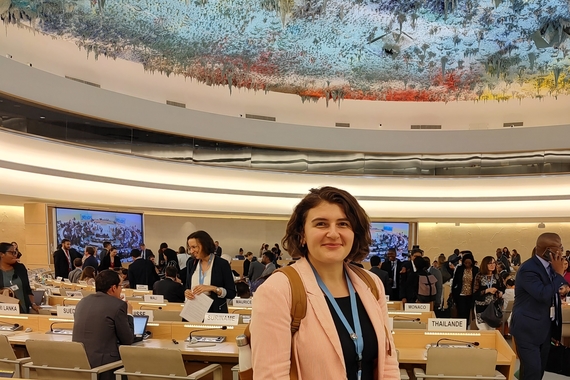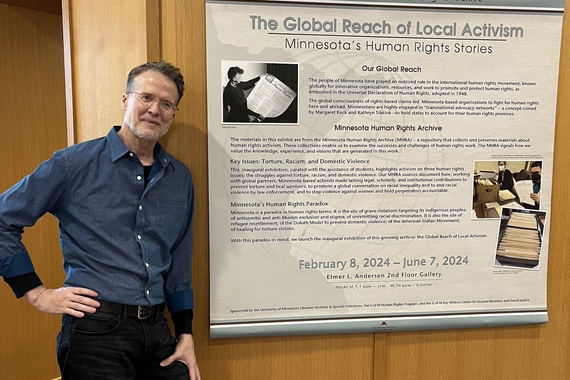Op-Ed: Is Trump Administration Attempting to Redefine International Human Rights?
Since the end of World War II, treaties and international institutions have defined and developed international human rights and institutions. Now, with little fanfare, the U.S. State Department has announced the establishment of the “Commission on Unalienable Rights.”[1] Here are the key provisions of the Commission’s Charter:
- The Commission will provide the Secretary of State with “informed advice and recommendations concerning international human rights matters . . . [and] fresh thinking about human rights and . . . reforms of human rights discourse where it has departed from our nation’s founding principles of natural law and natural rights.” (Para. 3) (emphasis added)
- The Commission’s advice and recommendations will help “guide U.S. diplomatic and foreign policy decisions and actions with respect to human rights in international settings . . . [and] recover that which is enduring for the maintenance of free and open societies.” (Para. 4) (emphasis added).
The Commission will be composed of “no more than fifteen members who have distinguished backgrounds in international law, human rights, and religious liberties.” Its membership “will be a bipartisan, diverse group of men and women.”
The phrase “unalienable rights,” of course, comes from the second paragraph of the U.S. Declaration of Independence of July 4, 1776: “We hold these truths to be self-evident, that all men are created equal; that they are endowed by their Creator with certain unalienable rights; that among these, are life, liberty, and the pursuit of happiness.”
An assault on international human rights?
At first glance, this may sound like an unobjectionable reference to an important document and concept of U.S. history. It may be much more than that. Eric Posner, Professor at the University of Chicago Law School, observes, “the significance of . . . [this Commission] should not be overlooked. It puts the government’s imprimatur on an assault upon one of the cornerstones of modern liberalism: international human rights.”
This conclusion, Posner argues, follows from the Commission’s name, implicitly emphasizing that these rights are endowed “by their Creator” and come from “natural law” and “natural rights.” This interpretation, he claims, is also suggested by the Charter’s reference to “discourse,” implying that contemporary human rights is merely talk, not law. In short, this Charter is conservatives’ “declaration of intent. Its plainly stated goal is not just to wipe away the baleful foreign influence of human rights ‘discourse’ but to revive [conservative] 18th-century natural law.”
In Posner’s opinion, the reference to natural law is an indirect endorsement of contemporary “Catholic conservative intellectuals, who kept alive the academic tradition of natural law long after mainstream secular intellectuals forgot what it was —[and, therefore,] . . . goodbye to reproductive rights and protections for sexual minorities.” Posner also claims that Robert George, a prominent Catholic intellectual, natural-law theorist, and opponent of abortion rights and same-sex marriage, played a role in the creation of the Commission. In other words, this new commission will provide “the ideological justification for the anti-abortion foreign policy that the Trump administration has undertaken.”
Natural law, says Posner, can also be used by conservatives to argue for “expanded religious freedoms that override statutes with secular goals, and to push back against progressive government programs like universal health care. The right to health, for instance, is firmly rejected by natural-law theorists like George.
“But the mission of the commission may be even bolder,” in Posner’s opinion. ”If we take the idea of natural law seriously, it not only overrides statutes in foreign countries that protect abortion rights and respect same-sex marriage. It also overrides American laws that protect abortion rights and respect same-sex marriage. One can imagine a day when a Supreme Court justice, taking a page from [former Supreme Court Justice Anthony] Kennedy, invokes natural law — supposedly endorsed by the founders, after all, and embodied in the sacred Declaration — to vote to overturn Roe v. Wade and to prepare the path for an even holier grail, the abolition of state laws that grant abortion rights.”
Or, a shield protecting individual freedom?
Others in support of the Commission include Aaron Rhodes, the President of the Forum for Religious Freedom Europe and author of The Debasement of Human Rights. Rhodes believes that the U.S. has “embraced moral equivalency in international human-rights institutions, and appeared indifferent to struggles for liberty around the world. The foreign-policy establishment has confused defending human rights with ambitious and costly democracy and nation-building projects. Rather than focus on freedom, they’ve sought to impose particular moral values on other societies.” He also claims that the U.S. has “recoiled from the toxic hypocrisy infecting international human-rights organizations.”
Therefore, according to Rhodes, the U.S. “needs to do more than criticize the international human-rights community; it must develop a human-rights doctrine consistent with the universalism of America’s core political principles—a policy to lead the world toward freedom in the face of rising authoritarianism and decaying international human-rights institutions.”
This does not require a redefinition of human rights, he says, but a return to “human rights . . . [as] a shield protecting individual freedom” with ‘natural law’ and ‘natural rights’ as the core foundational principles of human rights.”
Further concerns about the Commission on Unalienable Rights
Clifford Bob, Professor and Chair of Political Science at Duquesne University, raised several concerns about the Commission, which he notes is “likely to champion the ‘natural family’ and ‘traditional values.” Bob cites as evidence the Trump Administration’s imposition of a “global gag rule, banning support for international family planning programs that perform, promote or offer information about abortion;” its efforts to purge all U.N. references to “sexual and reproduction health;” and a threatened U.S. veto of a U.N. Security Council resolution on sexual violence in war zones.
Bob believes that the Commission will assert that individual self-defense is another unalienable right as a purported basis for opposing international and domestic gun control measures. This possibility was suggested this April at this April’s NRA convention by President Trump’s repudiating the Arms Trade Treaty as a threat to Americans’ Second Amendment freedoms.
Bob notes that another possible use of unalienable rights could be alleged justification for tougher policies on immigration as impinging on the claimed sovereign right of a people to protect its territorial integrity and established culture. More generally, according to Bob, the Commission will be hostile to economic and cultural rights, as expressed in the International Covenant on Economic, Social and Cultural Rights, which the U.S. has not ratified.
Harold Hongju Koh, a Yale law professor who was the State Department Legal Adviser during the Obama Administration, said that a shift to “natural law” would conflict with the view that “modern human rights are based on the dignity inherent in all human beings, not on God-given rights.”
Carol Giacomo, a member of the New York Times Editorial Board, said the Commission was a personal project of Secretary Pompeo, who has conservative political and religious beliefs. Some LGBTTQ groups fear that their rights could be threatened by this Commission.
Conclusion
Advocates for international human rights need to pay close attention to what this Commission does and to register vigorous objections to any attempts to redefine human rights.
For more details, see these posts to dwkcommentaries.com:
- Other Reactions to State Department’s Commission on Unalienable Rights (June 17, 2019)
- More Thoughts on Commission on Unalienable Rights (June 18, 2019)
- U.S. Commission on Unalienable Rights: Developments (July 4, 2019)
- U.S. Commission on Unalienable Rights is Launched (July 8, 2019)
- More Comments on Commission on Unalienable Rights (July 9, 2019)
[1] State Dep’t, Notice: Department of State Commission on Unalienable Rights, 84 Fed. Reg. 25109 (May 30, 2019); State Dep’t, Charter: Commission on Unalienable Rights (created: May 10, 2019); State Dep’t, Membership Balance Plan: Commission on Unalienable Rights (created: May 10, 2019).


